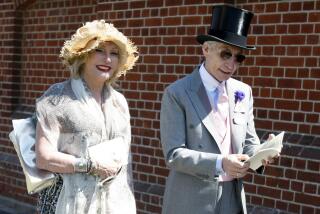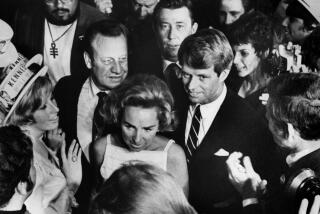Norma McCorvey, once-anonymous plaintiff in landmark Roe vs. Wade abortion case, dies at 69
When Norma McCorvey revealed on Dallas television station in 1984 that she was the “Roe” in the landmark case that led the Supreme Court to legalize abortion, she called it “my law.”
Fourteen years later, she told a U.S. Senate subcommittee that she would like nothing more than to see Roe vs. Wade overturned.
“I am dedicated to spending the rest of my life undoing the law that bears my name,” she said.
The statements reflected the ever-twisting personal journey of a woman who lived a difficult life and who went from being an anonymous plaintiff to a symbol for both sides of the abortion debate.
When word spread that McCorvey had died Saturday of heart failure at age 69 in an assisted living facility in Katy, Texas, abortion rights proponents remembered her indispensable role in Roe vs. Wade; abortion opponents celebrated her efforts to reverse it.
Her tempestuous personal story — she had three children by three men — sometimes made her an imperfect fit for the aims of activists. In “I Am Roe,” one of her two memoirs, she described her years as a teenage runaway and reform school inmate, a high school dropout who drifted from job to job. She was an addict, a lesbian and “a complete failure,” she declared.
“I am a rough woman, born into pain and anger and raised mostly by myself,” she wrote.
In 1970, McCorvey was more than two months pregnant when she met lawyers Sarah Weddington and Linda Coffee, who were preparing to contest the law that made it illegal to have an abortion in Texas, except by a doctor’s orders to save a woman’s life. The lawyers were looking for a plaintiff who wanted to terminate her pregnancy.
McCorvey signed the suit that contested the law, on the grounds that it violated the 9th Amendment to the Constitution, which guarantees the right to free choice and privacy.
She used the alias “Jane Roe” to avoid public scrutiny, and the case moved slowly from Dallas District Court to the Supreme Court. In the meantime, McCorvey gave birth to her baby. She never had the abortion.
The Supreme Court announced its decision in January 1973, ruling 7 to 2 that making abortion illegal was unconstitutional.
For some years, McCorvey remained secretive about her role in the case. When she revealed her identity in 1984, it was to endorse the decision. But in interviews that followed, she began to describe her troubled life.
“Baby Roe” was her third child, a girl like the others. She gave each one up for adoption because she felt unfit to raise them, McCorvey said.
McCorvey went on to attend abortion rights protests, but she felt the movement never truly embraced her. She was never a “poster child” of the movement because “poster people were supposed to look like suburban wives,” said David Garrow, the Pulitzer Prize-winning author of “Liberty and Sexuality: The Right to Privacy and the Making of Roe v. Wade.” That lack of connection, he said, reflected homophobia as well as social class.
In reality, McCorvey truly was a “representative plaintiff,” Garrow said. “It made perfect sense that a woman who needed an abortion in 1970 had a down-and-out life. If you had connections, you could get a safe abortion from a doctor.”
After signing the affidavit that launched Roe vs. Wade, McCorvey had little more to do with it. She and her lawyers agreed that she would not be called on to give a deposition or appear in court.
Weddington argued before the judges that the 9th Amendment gives a pregnant woman, not the court, the right to decide whether she will terminate her pregnancy.
When Dallas court judges decided in favor of “Roe,” the defendant, Dist. Atty. Henry Wade, said he would appeal. In the meantime, he said, he would continue to prosecute doctors who performed abortions.
Once her baby was born, in the summer of 1970, McCorvey lost track of the case. She learned about the Supreme Court decision by reading about it in the newspaper.
Norma Leah Nelson was born Sept. 22, 1947, in Lettesworth, La., north of Baton Rouge. The family moved to Houston, where her father, Olin, repaired radios and televisions and her mother, Mary Mildred, worked as a waitress. The couple divorced when Norma was 13. She moved to Dallas with her mother and her older brother.
Starting at about age 10, she began running away from home and spent time in reform schools. It was there that she realized she was a lesbian, she later wrote.
At 16, she married Woody McCorvey, a sheet metal worker she met in Dallas.
When she got pregnant, he beat her and said the baby wasn’t his. She went home to her mother, gave birth to her first baby and named her Melissa. Soon afterward, McCorvey’s mother took custody of the infant.
McCorvey got pregnant again during a brief relationship with a man she worked with at a Dallas hospital. When the baby was born, the child’s father adopted her and cut ties with McCorvey.
Pregnant a third time, she left her job with a traveling carnival and went to live with her father. After a difficult birth, she saw “Baby Roe” once before the girl went home with her adoptive parents.
At her father’s Dallas apartment, McCorvey slid into a deep depression, took an overdose of pills and drank a bottle of bourbon. She was near death when he came home from work.
The incident left her searching for a reason to live. She found it in her alias. Jane Roe was her alter ego, the powerful woman she always wanted to be, “the other woman, whose name was on the Supreme Court papers and someday, maybe, in the history books,” McCorvey wrote in her autobiography.
“Without Jane Roe, without a cause to fight for and a purpose for living, the original Norma would never have survived.”
Several years after her suicide attempt, McCorvey was leaving a grocery store with her purse stuffed with stolen food. The store manager, Connie Gonzalez, caught her but didn’t report her to the police. The pair began dating, and soon afterward McCorvey moved in with Gonzalez.
“Connie has taken care of me in hundreds of ways,” McCorvey wrote. “I have taken care of her as best I can.”
McCorvey settled into “regular person” status, she later said, but one day Weddington telephoned to say a Dallas reporter wanted to interview her. Among other reasons for agreeing, McCorvey said, she wanted public recognition for her part in the case.
Invitations to speak on college campuses and before women’s groups followed, and she consulted on a television movie, “Roe vs. Wade,” that starred Holly Hunter as McCorvey and won two Emmy Awards in 1990.
But McCorvey wasn’t prepared for the ways that the abortion controversy came to her front door. She received hate mail. She found doll clothes and trash scattered on her lawn. One dark morning in April 1989, she told reporters, someone shot out the windows of her house.
A few days later, she attended an abortion rights rally in Washington, D.C., organized by the National Organization for Women. She had been invited, but once she arrived, felt all but ignored. It was a familiar experience.
“They never gave me the respect I thought I deserved,” McCorvey said of abortion rights leaders in a 1995 television interview on “Nightline.”
A lot of McCorvey’s evolution from being a supporter of abortion rights to an opponent “had to do with her feelings of being treated like poor, working-class, white trash,” Garrow said.
Her doubts about legal abortion increased when she went to work at a Dallas abortion clinic. She met women who used the medical procedure for birth control. She worried about the lack of professional counseling at the clinic for women who were ambivalent about terminating their pregnancy. She alleged that one doctor performed an operation in bare feet.
McCorvey also complained that her lawyers never made it clear to her that the Roe vs. Wade case would probably take too long for her to benefit from a favorable verdict. In her view, they used her.
“I felt increasingly alienated” from the abortion rights movement, McCorvey wrote in a second memoir, “Won By Love,” in 1997.
Her doubts about Roe vs. Wade were tested when a leading anti-abortion group opened an office in the same strip mall as the clinic where she worked. At first, McCorvey exchanged snide remarks with abortion opponents and nicknamed their national president, the Rev. Philip Benham, “Flipper.”
Eventually, she and Benham began to talk. He baptized her in a Dallas swimming pool in August 1995, a religious conversion that made national news. Months later, she told the Washington Times that her relationship with Gonzalez had become platonic.
“I am not a lesbian. I’m just a child in Christ now,” she said.
McCorvey quit her job at the clinic, joined Benham and formed a speakers’ bureau named “Roe No More.” She later burned the Supreme Court decision that bore her name at a protest in a church parking lot, and tore it up outside the Mississippi state Capitol.
“She spent the better part of the last 25 years working to undo the terrible Supreme Court decision that bears her name,” said Troy Newman, president of Operation Rescue, who described her as a longtime friend. He added in an interview, “As Christians, we understand that God allows you U-turns.”
Abortion rights attorney Gloria Allred, who represented McCorvey before her religious conversion, called her “a very complicated person” who had continued to speak warmly with Allred throughout her life.
In her later years, McCorvey gradually drifted back to “normal person” status. But she was confident that her unusual story would be remembered. “I do not fit many people’s idea of a historical role model,” she said.
Rourke is a former Times staff writer.
ALSO
U.S. abortion rate drops to a new low, but there’s a fight over why
UPDATES:
11:30 a.m.: This article was updated with information about McCorvey’s cause of death.
This article was originally published at 11 a.m.
More to Read
Start your day right
Sign up for Essential California for the L.A. Times biggest news, features and recommendations in your inbox six days a week.
You may occasionally receive promotional content from the Los Angeles Times.






